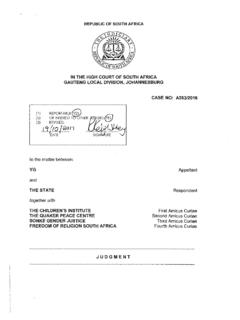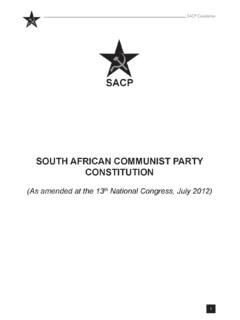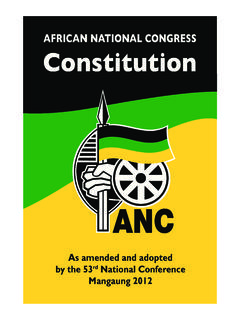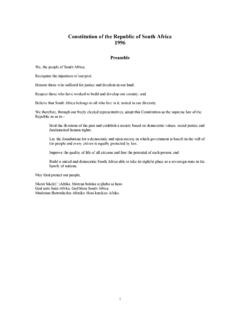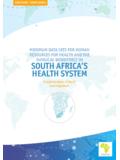Transcription of LAW, DEMOCRACY & DEVELOPMENT L’etat, C’est …
1 LAW, DEMOCRACY & DEVELOPMENT . L'etat, C'est Moi: Why provincial Intra- governmental disputes in south Africa remain ungoverned by the final constitution and the Intergovernmental Relations Framework Act and how we can best resolve them STU WOOLMAN. Associate Professor, University of Pretoria; Senior Research Fellow, south African Institute for Advanced Constitutional Law; Editor-in-Chief, Constitutional Law of south Africa 1 INTRODUCTION: THE LACUNA IN THE LAW. For years, lawyers, jurists and academics bemoaned a great gaping hole in our law: the Final Constitution had promised to establish a legal regime to medi- ate and to resolve intergovernmental conflicts. (Constitution of the Republic of south Africa, 1996 (Act 108 of 1996)( Final Constitution or FC ).)
2 1 During 1 Constitution of the Republic of south Africa, 1996 Chapter 3, Co-operative Government, reads as follows: 40 (1) In the Republic, government is constituted as national, provincial and local spheres of government, which are distinctive, interdependent and interrelated. (2) All spheres of government must observe and adhere to the principles in this chapter and must conduct their activities within the parameters that the chapter provides. 41 Principles of co-operative government and intergovernmental relations: (1) All spheres of government and all organs of state within each sphere must: (a) preserve the peace, national unity and the indivisibility of the Republic; (b) secure the well-being of the people of the Republic; (c).
3 Provide effective, transparent, accountable and coherent government for the Republic as a whole;. (d) be loyal to the Constitution, the Republic and its people; (e) respect the constitutional status, institutions, powers and functions of government in the other spheres; (f) not assume any power or function except those conferred on them in terms of the Constitution; (g) exercise their powers and perform their functions in a manner that does not encroach on the geographical, functional or institutional integrity of government in another sphere; and (h) co-operate with one another in mutual trust and good faith by: (i) fostering friendly relations; (ii) assisting and supporting one another; (iii) informing one another of, and consulting one another on, matters of common interest.
4 (iv) co-ordinating their actions and legislation with one another; (v) adhering to agreed procedures; and (vi) avoiding legal proceedings against one another. (2) An Act of Parliament must (a) establish or provide for structures and institutions to promote and facilitate intergovernmental relations; and (b) provide for appropriate mechanisms and procedures to facilitate settlement of intergovernmental disputes . (3) An organ of state involved in an intergovernmental dispute must make every reasonable effort to settle the dispute by means of mechanisms and procedures provided for that purpose, and must exhaust all other remedies before it approaches a court to resolve the dispute. (4) If a court is not satisfied that the requirements of subsection (3) have been met, it may refer a dispute back to the organs of state involved.
5 62. 62 10/8/09 11:08:18 AM. L'ETAT, C'EST MOI. the first decade of post-apartheid south African life (1996 2005), Parliament failed to make good FC s 41(2)'s guarantee that intergovernmental disputes would be resolved by legislation that prevented different spheres of govern- ment and opposing organs of state from going to war (or court) over vital policy matters. The courts did their part in holding things together. Although initially vexed by Parliament's failure to produce FC s 41(2)'s constitutionally mandated super-ordinate legislation, the Constitutional Court gradually became less sanctimonious about this lacuna in the In the absence of FC s 41(2) legislation, the Court did the best with what it had.
6 In First Certification Judgment, the Constitutional Court held that FC. s 41(1)(h)(vi) had to be read together with FC s 41(3).3 It seemed to imply that the latter provision was the primary source of the duty to avoid litigation. In particular, FC s 41(3) meant that disputes should where possible be resolved at a political level rather than through adversarial litigation. 4 The inclusion of this provision did not, however, oust the courts' jurisdiction to hear inter- governmental disputes or deprive any organ of government of the powers vested in it under [the Constitution]. 5 In National Gambling Board, the Court effectively reversed the normative hierarchy it had established between FC.
7 S 41(1)(h)(vi) and FC s 41(3) in First Certification The stated reason for the reversal was that, in the five years separating the two deci- sions, the Act of Parliament contemplated in FC s 41(2) had not been passed and no formal mechanisms and procedures were put in place to resolve intergovernmental disputes . Given the absence of such mechanisms and procedures, some doubt was expressed as to whether, in the absence of FC. s 41(2) legislation, the Court could enforce FC s 41(3). In order to avoid hav- ing to decide this point, the Court held that the duty to avoid litigation could be independently founded on FC s 41(1)(h)(vi).7 The Court then enunciated what this duty The first two judgments on the duty to avoid litiga- tion can be reconciled by reading National Gambling Board as giving content to the Court's statement in First Certification Judgment that intergovernmental disputes should be resolved at a political level.
8 In both decisions, the Court drew a line between political and legal forms of dispute resolution. The ques- 2 National Gambling Board v Premier of KwaZulu-Natal & Others 2002 (2) SA 715 (CC), 2002 (2) BCLR. 156 (CC)( National Gambling Board ) at para 32 ( I]t could be argued that the failure of Parliament to comply with its obligations in terms of [FC s 41(2] has rendered the important provisions of [FC. ss 41(3) and 41(4)] inoperative. For reasons that follow, it is not necessary to decide that now. However, even the possibility that such an argument could be raised emphasizes the urgent need for the envisaged legislation. Co-operative government is foundational to our constitutional endeavor.))
9 The fact that the Act envisaged in section 41(2) has not been passed requires the attention of the Minister for Justice and Constitutional DEVELOPMENT . ). 3 Ex Parte Chairperson of the Constitutional Assembly: In Re Certification of the Constitution of the Republic of south Africa, 1996 1996 (4) SA 744 (CC), 1996 (10) BCLR 1458 (CC)( First Certification Judgment ) at para 291. 4 Ibid. 5 Ibid. 6 National Gambling Board (supra) at para 33. 7 Ibid at para 31. 8 Ibid at paras 35-36. 63. 63 10/8/09 11:08:18 AM. LAW, DEMOCRACY & DEVELOPMENT . tion as to whether or not FCs 41(1)(h)(vi) has been violated, and by extension whether the requirements of FC s 41(3) have been met, depends on whether all extra-judicial avenues (or remedies) for resolving the dispute have been Three factors are relevant to this inquiry: (1) the seriousness of 9 I have consciously chosen to avoid the use of the term remedies as it appears in s 41(3).
10 Peter Birks taxonomy of remedies captures five different denotations of the term in English law: a cause of action , to a right born of a wrong , to a right born from a court order , a right born of an injustice . and right born of a court's order issued on a discretionary basis. P Birks Rights, Wrongs and Rem- edies (2000) 20 Oxford Journal of Legal Studies 1, 9 17 (The two meanings not mentioned in the text are or grievance, and.) See also R Zakraewski Remedies Reclassified (2005). A panoply of purposes for the term exist in south African law: a statutory right (Fedsure Life Assurance Ltd v Wolfaardt 2002 (1). SA 49 (SCA) at para 2: The 1956 Act created a statutory remedy for the commission of what was referred to as an unfair labour practice which was soon interpreted by the Courts to C include the unfair dismissal of an employee ); a common-law right (Standard Bank of south Africa Ltd v Onean- ate Investments (Pty) Ltd (In Liquidation) 1998 (1) SA 811, 821A (A)( Its remedy, if any, was to sue Oneanate by way of a condictio ); an order of summary judgment (First National Bank of SA Ltd v Myburgh 2002 (4) SA 176 (C) at para 8 ( Summary judgment is designed to give plaintiff a speedy and cost-effective remedy in the case where the defendant does not disclose a valid and bona fide defence.)))







